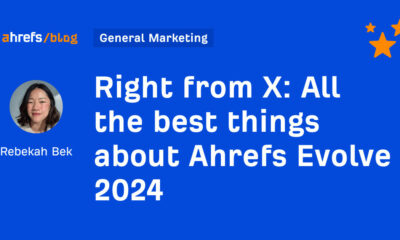MARKETING
SEM vs. SEO vs. PPC Defined: What’s the Difference?
As someone who likes to think he is organized – or, as someone who at least likes to organize things – I’ve attempted to treat digital marketing terms similarly.
The same can be said for now-Googler and search industry pioneer Danny Sullivan when he began routinely using the term “search engine marketing” in 2001 to describe the overarching niche within the digital marketing industry that focuses on search engines.
As my thinking went (and as Sullivan admits he intended), search engine marketing, or SEM, would be (and once was) a useful way to summarize and classify both the paid and non-paid initiatives that go into digital marketing via search engines.
That would mean both the pay-per-click advertisements, or PPC ads, and the organic search initiatives commonly referred to as search engine optimization, or SEO, would fall under that SEM blanket term.
SEM would be the category of marketing through search engines. The paid (PPC) and non-paid (SEO) channels of SEM would both fall under it in terms of hierarchy.
And, even when you consider the literal terminology in coordination with this idea of SEO and PPC falling under that SEM blanket, it almost makes sense.
But, much like the English language, pop culture, and the Cleveland Browns, it simply can’t work the way it’s supposed to.
There will always be exceptions to the rule (like the aforementioned conundrums above).
So, confusing it may be. But the search industry shapes itself, and it has not agreed with Mr. Sullivan over the years, adopting the term SEM to fit strictly into the paid search sphere.
It surely appears it’s there to stay, too.
Difference Between SEM & PPC
PPC is SEM.
That is, pay-per-click advertising (PPC) is the same as search engine marketing (SEM), or at least a vital part of it.
SEO is none of those things.
What likely evolved over time due to the multiple potentially confusing digital marketing acronyms, as well as the need to define specific paid initiatives outside of Google paid search, brought two heavily used cost-driven marketing terms to mean the same thing (leading to even more potential confusion from newbies).
I’ve always tried to make sense of the literal meaning of things, too, especially acronyms.
But from there, it’s easy to get even more lost in the idea.
While the breakdown of the abbreviation PPC is spot on — regardless if it’s called PPC, CPC, paid search, search ads – we know it is referring to paid search marketing, typically through search engines like Google and Bing.
Other terms and tactics used in digital marketing initiatives – especially those tied to search marketing tactics (both paid and organic) – may not be so simple and clearly defined, though.
Difference Between SEO & PPC
We know SEO is search engine optimization.
But, to echo the sentiments of search pioneer Mike Grehan, that never did make much sense.
Marketers aren’t optimizing search engines; we’re optimizing content and websites for search engines (secondly, right after optimizing them for humans) so they can better understand, access, and relay our property to the masses.
Again, acronyms don’t always make sense. So, naturally, this is a bit illogical.
Just like other things in life that don’t always add up, there are some acronyms that will never make sense either.
Like Humvee, which doesn’t stand for any words that start with U or E in them. (It actually stands for High Mobility Multipurpose Wheeled Vehicle, and was spawned from the original acronym, HMMWV.)
We’ve also determined that PPC marketing is (at least now) the same as, or a very large part of, SEM.
- Both are paid initiatives.
- Both need budget.
- Both make search engines like Google and other advertising platforms a lot of money.
But, while Wikipedia defines SEM as “a form of Internet marketing that involves the promotion of websites by increasing their visibility in search engine results pages (SERPs) primarily through paid advertising,” it’s not so quick to call them the same exact thing.
In fact, pay-per-click marketing has its own separate Wikipedia page than the topic of search engine marketing (despite there being plenty of discrepancies and confusion throughout the page).
The bottom line is this:
SEO is not a component of SEM.
And, while PPC is typically the largest and most demanding component of SEM, both PPC and SEM are paid initiatives that offer real-time data, ROI, and protected data that can only be accessed by advertisers of certain platforms.
Why It Matters
The most important reason for clarification around these important terms and abbreviations is consistency.
Too many novice marketers, or marketers who aren’t specialists in maximizing value through search, have adopted these industry definitions and crossed them, combined them, confused them, and used them in a way that only further diluted their true meaning.
And even well-seasoned marketers who simply didn’t agree with or possibly even completely understand the terms themselves help contribute to the turning tide as well.
Conferences have set up entire segments of their educational offering around the SEM naming convention when referring to strictly paid marketing efforts, but those efforts aren’t strictly done through search engines.
SEM, at least from this perspective, includes PPC ads on search engines but also on third-party platforms like Amazon and YouTube, as well as industry-focused platforms like Houzz, or Thumbtack, or Yelp. It also includes display ads and remarketing efforts.
And, as the opportunity to advertise on social media continues to grow, it tends to include paid advertising on those networks, too.
Keeping the definitions and their usage consistent is going to be the best way to keep the information organized in a way that makes sense for marketers.
It also helps us as marketers to convey our thoughts and ideas to clients and their stakeholders, our peers, or a friend who is curious about what exactly it is we do for a living.
Using the Marketing Right Terms for the Right People & Setting
When discussing digital marketing – specifically search marketing – and how it pertains to a brand or message, it’s important for marketers to use language that is digestible for clients and potential clients.
Needless to say, 8 out of 10 times, non-marketers already don’t know the difference between incredibly different key terms.
Like SEO and PPC (or SEM), when speaking to someone outside of the search marketing community, these terms need to be clearly defined at least once, and typically more than once, throughout the conversation.
We all have those new-business pitch stories where a client goes on throughout years of his or her life thinking SEO is responsible for paid search ads or that paid search ads were achieved through organic optimizations.
First, the terms must be understood on a level playing field. Hopefully, this post helps do that.
We now are in agreement that:
- SEM and PPC refer to paid initiatives through search and other advertising platforms on the internet.
- While SEO is the organic effort that goes into marketing through search engines.
Secondly, we must always consider who the audience is and the level of knowledge it has when it comes to digital marketing, particularly search marketing, while also ensuring we detail:
- What each term means.
- How it works.
- How it relates to the audience’s goals.
Lastly, and most importantly, we must never assume someone on the other end of our conversation knows what we are referring to when we use important industry terms like SEO, PPC, or SEM.
We must be concise and explain exactly what is we are talking about. Ensure the group partaking in the conversation is in agreement.
On a bad day, someone else in the room may disagree and tell us we are wrong.
On a good day, though, we’ll get a room full of people all on the same page who are able to move forward and correctly use consistent terminology for some of the most important practices in digital marketing today.
MARKETING
YouTube Ad Specs, Sizes, and Examples [2024 Update]
![YouTube Ad Specs, Sizes, and Examples [2024 Update] YouTube Ad Specs, Sizes, and Examples](https://articles.entireweb.com/wp-content/uploads/2024/06/YouTube-Ad-Specs-Sizes-and-Examples.jpg)
Introduction
With billions of users each month, YouTube is the world’s second largest search engine and top website for video content. This makes it a great place for advertising. To succeed, advertisers need to follow the correct YouTube ad specifications. These rules help your ad reach more viewers, increasing the chance of gaining new customers and boosting brand awareness.
Types of YouTube Ads
Video Ads
- Description: These play before, during, or after a YouTube video on computers or mobile devices.
- Types:
- In-stream ads: Can be skippable or non-skippable.
- Bumper ads: Non-skippable, short ads that play before, during, or after a video.
Display Ads
- Description: These appear in different spots on YouTube and usually use text or static images.
- Note: YouTube does not support display image ads directly on its app, but these can be targeted to YouTube.com through Google Display Network (GDN).
Companion Banners
- Description: Appears to the right of the YouTube player on desktop.
- Requirement: Must be purchased alongside In-stream ads, Bumper ads, or In-feed ads.
In-feed Ads
- Description: Resemble videos with images, headlines, and text. They link to a public or unlisted YouTube video.
Outstream Ads
- Description: Mobile-only video ads that play outside of YouTube, on websites and apps within the Google video partner network.
Masthead Ads
- Description: Premium, high-visibility banner ads displayed at the top of the YouTube homepage for both desktop and mobile users.
YouTube Ad Specs by Type
Skippable In-stream Video Ads
- Placement: Before, during, or after a YouTube video.
- Resolution:
- Horizontal: 1920 x 1080px
- Vertical: 1080 x 1920px
- Square: 1080 x 1080px
- Aspect Ratio:
- Horizontal: 16:9
- Vertical: 9:16
- Square: 1:1
- Length:
- Awareness: 15-20 seconds
- Consideration: 2-3 minutes
- Action: 15-20 seconds
Non-skippable In-stream Video Ads
- Description: Must be watched completely before the main video.
- Length: 15 seconds (or 20 seconds in certain markets).
- Resolution:
- Horizontal: 1920 x 1080px
- Vertical: 1080 x 1920px
- Square: 1080 x 1080px
- Aspect Ratio:
- Horizontal: 16:9
- Vertical: 9:16
- Square: 1:1
Bumper Ads
- Length: Maximum 6 seconds.
- File Format: MP4, Quicktime, AVI, ASF, Windows Media, or MPEG.
- Resolution:
- Horizontal: 640 x 360px
- Vertical: 480 x 360px
In-feed Ads
- Description: Show alongside YouTube content, like search results or the Home feed.
- Resolution:
- Horizontal: 1920 x 1080px
- Vertical: 1080 x 1920px
- Square: 1080 x 1080px
- Aspect Ratio:
- Horizontal: 16:9
- Square: 1:1
- Length:
- Awareness: 15-20 seconds
- Consideration: 2-3 minutes
- Headline/Description:
- Headline: Up to 2 lines, 40 characters per line
- Description: Up to 2 lines, 35 characters per line
Display Ads
- Description: Static images or animated media that appear on YouTube next to video suggestions, in search results, or on the homepage.
- Image Size: 300×60 pixels.
- File Type: GIF, JPG, PNG.
- File Size: Max 150KB.
- Max Animation Length: 30 seconds.
Outstream Ads
- Description: Mobile-only video ads that appear on websites and apps within the Google video partner network, not on YouTube itself.
- Logo Specs:
- Square: 1:1 (200 x 200px).
- File Type: JPG, GIF, PNG.
- Max Size: 200KB.
Masthead Ads
- Description: High-visibility ads at the top of the YouTube homepage.
- Resolution: 1920 x 1080 or higher.
- File Type: JPG or PNG (without transparency).
Conclusion
YouTube offers a variety of ad formats to reach audiences effectively in 2024. Whether you want to build brand awareness, drive conversions, or target specific demographics, YouTube provides a dynamic platform for your advertising needs. Always follow Google’s advertising policies and the technical ad specs to ensure your ads perform their best. Ready to start using YouTube ads? Contact us today to get started!
MARKETING
Why We Are Always ‘Clicking to Buy’, According to Psychologists

Amazon pillows.
MARKETING
A deeper dive into data, personalization and Copilots

Salesforce launched a collection of new, generative AI-related products at Connections in Chicago this week. They included new Einstein Copilots for marketers and merchants and Einstein Personalization.
To better understand, not only the potential impact of the new products, but the evolving Salesforce architecture, we sat down with Bobby Jania, CMO, Marketing Cloud.
Dig deeper: Salesforce piles on the Einstein Copilots
Salesforce’s evolving architecture
It’s hard to deny that Salesforce likes coming up with new names for platforms and products (what happened to Customer 360?) and this can sometimes make the observer wonder if something is brand new, or old but with a brand new name. In particular, what exactly is Einstein 1 and how is it related to Salesforce Data Cloud?
“Data Cloud is built on the Einstein 1 platform,” Jania explained. “The Einstein 1 platform is our entire Salesforce platform and that includes products like Sales Cloud, Service Cloud — that it includes the original idea of Salesforce not just being in the cloud, but being multi-tenancy.”
Data Cloud — not an acquisition, of course — was built natively on that platform. It was the first product built on Hyperforce, Salesforce’s new cloud infrastructure architecture. “Since Data Cloud was on what we now call the Einstein 1 platform from Day One, it has always natively connected to, and been able to read anything in Sales Cloud, Service Cloud [and so on]. On top of that, we can now bring in, not only structured but unstructured data.”
That’s a significant progression from the position, several years ago, when Salesforce had stitched together a platform around various acquisitions (ExactTarget, for example) that didn’t necessarily talk to each other.
“At times, what we would do is have a kind of behind-the-scenes flow where data from one product could be moved into another product,” said Jania, “but in many of those cases the data would then be in both, whereas now the data is in Data Cloud. Tableau will run natively off Data Cloud; Commerce Cloud, Service Cloud, Marketing Cloud — they’re all going to the same operational customer profile.” They’re not copying the data from Data Cloud, Jania confirmed.
Another thing to know is tit’s possible for Salesforce customers to import their own datasets into Data Cloud. “We wanted to create a federated data model,” said Jania. “If you’re using Snowflake, for example, we more or less virtually sit on your data lake. The value we add is that we will look at all your data and help you form these operational customer profiles.”
Let’s learn more about Einstein Copilot
“Copilot means that I have an assistant with me in the tool where I need to be working that contextually knows what I am trying to do and helps me at every step of the process,” Jania said.
For marketers, this might begin with a campaign brief developed with Copilot’s assistance, the identification of an audience based on the brief, and then the development of email or other content. “What’s really cool is the idea of Einstein Studio where our customers will create actions [for Copilot] that we hadn’t even thought about.”
Here’s a key insight (back to nomenclature). We reported on Copilot for markets, Copilot for merchants, Copilot for shoppers. It turns out, however, that there is just one Copilot, Einstein Copilot, and these are use cases. “There’s just one Copilot, we just add these for a little clarity; we’re going to talk about marketing use cases, about shoppers’ use cases. These are actions for the marketing use cases we built out of the box; you can build your own.”
It’s surely going to take a little time for marketers to learn to work easily with Copilot. “There’s always time for adoption,” Jania agreed. “What is directly connected with this is, this is my ninth Connections and this one has the most hands-on training that I’ve seen since 2014 — and a lot of that is getting people using Data Cloud, using these tools rather than just being given a demo.”
What’s new about Einstein Personalization
Salesforce Einstein has been around since 2016 and many of the use cases seem to have involved personalization in various forms. What’s new?
“Einstein Personalization is a real-time decision engine and it’s going to choose next-best-action, next-best-offer. What is new is that it’s a service now that runs natively on top of Data Cloud.” A lot of real-time decision engines need their own set of data that might actually be a subset of data. “Einstein Personalization is going to look holistically at a customer and recommend a next-best-action that could be natively surfaced in Service Cloud, Sales Cloud or Marketing Cloud.”
Finally, trust
One feature of the presentations at Connections was the reassurance that, although public LLMs like ChatGPT could be selected for application to customer data, none of that data would be retained by the LLMs. Is this just a matter of written agreements? No, not just that, said Jania.
“In the Einstein Trust Layer, all of the data, when it connects to an LLM, runs through our gateway. If there was a prompt that had personally identifiable information — a credit card number, an email address — at a mimum, all that is stripped out. The LLMs do not store the output; we store the output for auditing back in Salesforce. Any output that comes back through our gateway is logged in our system; it runs through a toxicity model; and only at the end do we put PII data back into the answer. There are real pieces beyond a handshake that this data is safe.”













